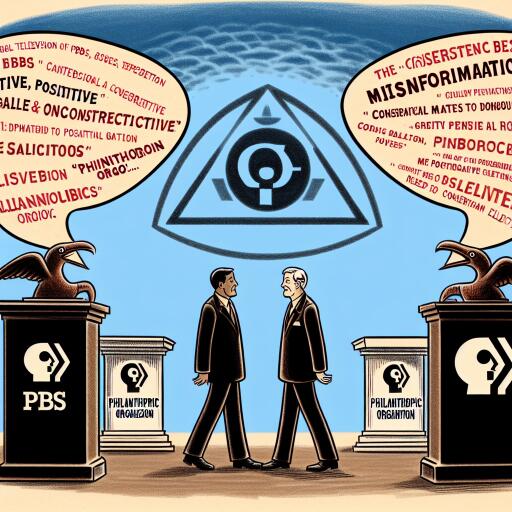Tackling the Tension: Public Broadcasting and Political Funding Entwine in Election Misinformation Debate
Amid rising concerns over the influence of misinformation on democratic processes, public and privately funded organizations are stepping into the arena to address the challenges posed by digital platforms in the lead-up to future elections. Among these, the Public Broadcasting Service (PBS) finds itself at the confluence of public interest and private funding, navigating the murky waters of election integrity and social media’s role.
A recent segment aired by PBS delved into the pressing question: “Can social media companies safeguard future elections against the tide of misinformation?” This inquiry comes at a crucial time when digital platforms are under scrutiny for their role in disseminating varying degrees of misleading content. Highlighting the gravity of the situation, PBS drew upon insights from Free Press, a group known for its progressive stances and which has received funding from notable figures like George Soros, a prolific supporter of liberal causes.
The discussion further widened to include perspectives from Katie Harbath, a former Facebook Director of Public Policy, who shed light on the complex relationship between government oversight and tech companies’ efforts to self-regulate. Harbath pointed out substantial investments by platforms like TikTok—which has connections to the Chinese government—in safeguarding electoral integrity. However, she also acknowledged the challenges in striking a balance between combating misinformation and preserving free speech.
The segment elaborated on the concerns raised by Free Press regarding the rollback of 17 policies by major social media players aimed at curbing hate speech and misinformation. These rollbacks, according to the group, alongside staff layoffs, potentially weaken the enforcement of remaining safeguards. The discourse also touched upon the allowance of controversial political advertisements on platforms owned by Meta and Google, sparking further debate on the thin line between freedom of expression and protection against falsehood.
Interestingly, Free Press, in its quest against misinformation, has stirred controversy through provocative statements on its platform, illustrating the charged atmosphere surrounding the media’s role in politics. Despite receiving financial support from Soros’s Open Society Foundations, Free Press’s active engagement in these discussions highlights the complexity of funding sources intersecting with advocacy.
Harbath’s commentary during the PBS segment opened up avenues for discussing the necessary synergies between tech giants and government bodies in the fight against misinformation. Although she recognized the potential for over-censorship, Harbath emphasized the need for more concerted efforts in election integrity, especially in the age of rapidly advancing artificial intelligence.
This discourse comes on the heels of findings by the Media Research Center, which suggest a significant portion of voters might have been influenced by the suppression of certain scandals by both Big Tech and traditional media outlets during the last presidential election cycle. This underscores the ongoing dilemma of ensuring information integrity while safeguarding democratic principles.
As public discourse continues to evolve, the intersection of technology, politics, and funding raises pertinent questions about the future of election integrity and the role of media in shaping democratic outcomes. The call for a balanced approach to governance and oversight in this digital age remains louder than ever, urging stakeholders to tread carefully in the complex web of information dissemination and public discourse.









